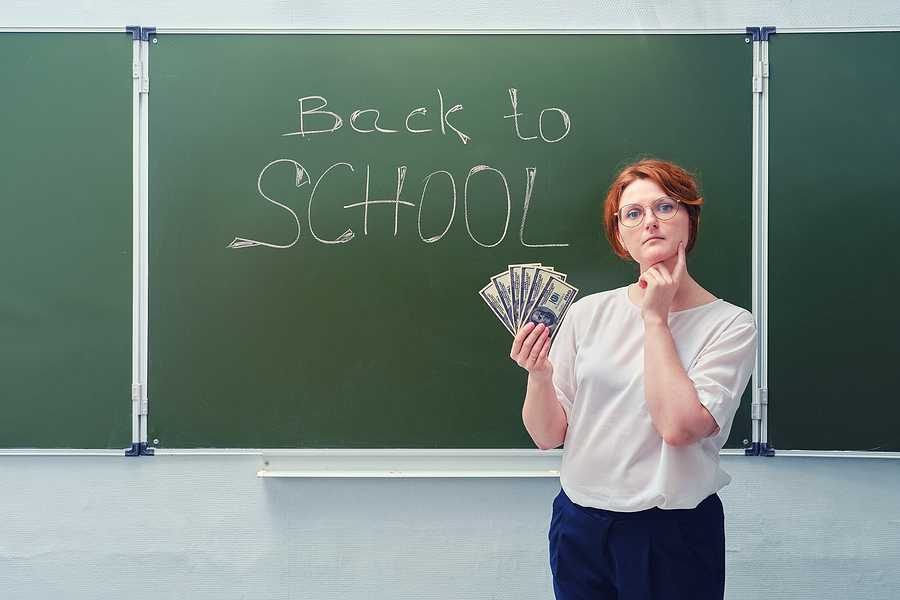
Out-of-Pocket Expenses for Educators
If your employer were to set aside $250 from your paycheck and then use it later to pay you back a portion of what you spent in out-of-pocket expenses for classroom supplies, would you consider it a reimbursement? In 2019, the Economic Policy Institute estimated that teachers spend an average of $459 nationally for classroom and student needs. It would seem that any effort to reduce the amount educators spend from their own pocket would begin with a look at the reasons why that teacher-spending is necessary to begin with. Instead, SB 528 seeks to require districts to set aside a portion of general fund monies to “reimburse” teachers to the tune of $250, but does so without appropriating any money to support this new requirement.
To hear legislators speak about this, it would appear that their intent is a noble one. But, like many bills that come from the Kansas Legislature, a closer inspection reveals something troubling. Under the bill, schools must set aside from the district’s general fund $250 for each teacher. Because this is the same pool of money used for salaries and benefits, this law effectively withholds dollars that could be used for those purposes. The bill goes further to say that only certain items are approved to qualify for “reimbursement,” and that none of those materials can be used beyond the school year.
KNEA opposes this bill because we believe that using general fund monies available for salaries for this purpose is simply “robbing Peter to pay Peter.” To require teachers to then make qualifying purchases to receive these payments makes the idea worse.
If the legislature wants to truly reimburse educators for out-of-pocket expenses, it should appropriate the estimated $10 million-plus needed to support $250 for each Kansas teacher. Further, the rules for accessing those reimbursements should be reasonable.
Districts could do their part as well. Many districts have chosen to use a recent influx of federal COVID relief dollars to pay for improvements that would normally be used for capital improvements like HVAC systems instead of using these dollars to compensate faculty and staff for their tireless work during the pandemic. This allows district planners to make upgrades and protect existing dollars that can only be spent on capital improvements and not on salaries.
The end of three co-equal branches of government?
Led by an ultra-conservative faction of the GOP majority in the Kansas Legislature, an effort is underway to eliminate a fundamental principle of our democracy. As we all learn in school, a democratic republic can only thrive under a system of checks and balances. Those checks and balances are made possible because the three branches of government (executive, legislative and judicial) are co-equal. When one of those branches seeks to grab power from the other branches, checks, and balances ensuring that no single ideology is able to spread unchecked, is threatened.
That’s exactly what is happening in Kansas with an effort to amend the state constitution in a number of ways. Specifically, SCR (Senate Concurrent Resolution) 1621, 1622, 1617, and 1609 seek to make the selection of Supreme Court Justices a partisan affair and to reduce the power of the executive branch and confer that power to the legislative branch. 1617 and 1609 aim to strip the executive branch of constitutional authority for certain actions while conferring that power to the legislature.
Of great concern to all those interested in non-partisan fairness, SCR 1621 and 1622 seek to change the way supreme court justices are selected away from a merit-based, non-partisan system, to one where partisanship rules and justices are assured to render decisions based upon party affiliations. Imagine justices who seek office under a system of million-dollar ad campaigns and partisan mud-slinging rather than what we currently enjoy where justices are nominated and confirmed after a bi-partisan legislative process.
Read a special opinion editorial from a former KNEA Director of Government Relations here.
We hope all KNEA members along with parents and families whose children attend public schools will remember that it was the non-partisan supreme court who- after nearly a decade lost to Governor Brownback’s failed experiment- ruled that students were not receiving adequate and equitable school funding. We also recall that it was this same court that ruled against KNEA as we argued that middle-of-the-night logrolling of policy into a funding bill resulted in the loss of statutory due process protection for K-12 teachers. A non-partisan, co-equal judiciary is a vital part of our democracy
A non-partisan judiciary is vital for Kansans to ensure that checks and balances are in place. Partisan Supreme Court Justices only ensure that a single ideology will monopolize Kansas policies.

Looking Ahead
*Please note: there are many bills up for hearings, debate, and votes from week to week. This is just a sampling of some we are following. Bills can change and often do, and sometimes KNEA’s position may change as well.
SB 484- KNEA OPPOSES
This bill seeks to bar transgender athletes from participating in certain athletic activities. This discriminatory bill seeks to further marginalize a specific group of students. KHSAA (Kansas High School Activities Association) already has policies that address the issue. A hearing is set for today, March 7, 2022. We will report further on this bill in the next edition of Under the Dome.
SB 541- KNEA OPPOSES
This is a monster bill that dares school districts (cities, counties, and other local entities) to enact any policies that ensure the safety and well-being of students and citizens. In doing so, it forces these locally elected bodies to choose between health and safety or the threat of never-ending, costly litigation. Further, it effectively eliminates the requirement for any school vaccines and adds a requirement that districts must first receive proof of infection for any unvaccinated students who may be infected and are exhibiting symptoms of virtually any transmissible illness prior to being prohibited from attending in-person classes. In other words, everyone else must first be put at risk. Hearing planned for March 7, 2022.
SB 455- KNEA Opposes
Allows K-12 students to attend any school district regardless of boundaries.


